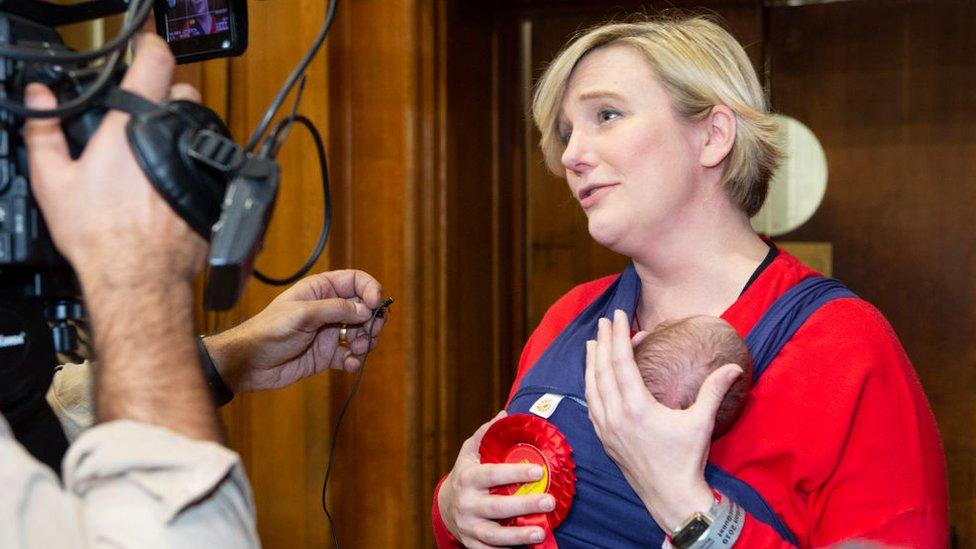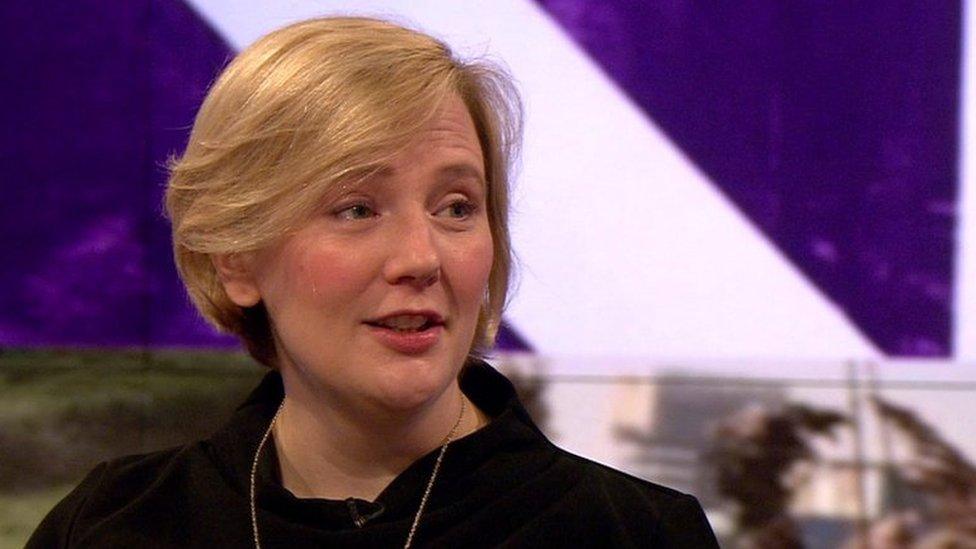Stella Creasy threatens legal action over maternity cover
- Published

Stella Creasy's first child was born two weeks before the 2019 general election
Labour MP Stella Creasy has threatened to sue Parliament after her request for full maternity cover was rejected.
Ipsa - the body which regulates MPs' pay - offers MPs £60,000 per year pro rata to hire extra staff.
However it also says functions, such as taking part in Commons debates, could not be done by anyone except the MP.
Ms Creasy - who is seven months pregnant - has asked for a "like for like" replacement to cover her maternity leave.
She said "rights mean nothing if they cannot be realised" adding "any reduction in the quality of representation during this time, perceived or actual, is likely to undermine the MP's standing among her constituents."
She argued that this could "discourage" voters from supporting candidates of childbearing age.
Responding to the MP's call, Ipsa said it had increased the funding available for extra members of staff to cover maternity leave from £50,000 to £60,000 per year, pro rata.
It also added that MPs continue to receive their full salary for the whole of their absence.
On the question of providing a replacement with the same status as an MP, the authority said: "Constitutionally no-one can take on the full roles and responsibilities of a member of Parliament, who is an office holder elected by the general public."
It added that it would be up to Parliament to change the law to allow unelected people to take on the duties of an MP such as attending House of Commons debates.
In 2019, Ms Creasy, while on maternity leave with her first child, employed a "locum" MP to cover her duties.
The employee covered constituency work but could not sit in the House of Commons or vote.
'Two-tier system'
The Walthamstow MP has been supported by four trade unions, the campaigning group Pregnant then Screwed and the Mumsnet website in her campaign.
In an open letter to Ipsa, the groups note that a law passed earlier this year ensured ministers would be able to take six months' leave on full ministerial pay, and that the salary costs for a temporary replacement would be covered.
The letter said: "This creates a two-tier system under which those who hold senior positions in Parliament as cabinet ministers or senior members of the official opposition receive more generous maternity-related entitlements than others in the same workplace including backbench and opposition MPs.
"The right to maternity cover is determined not by the role a woman does, but whether she is pregnant, so in any other workplace this situation would be considered discrimination."
Ipsa does not have a role in setting ministers' salaries, which is instead the responsibility of the government.
Joeli Brearley, CEO and founder of Pregnant Then Screwed said the current rules forced MPs "to choose between their child and their constituents".
"This is bad for democracy and for equality - if Parliament can't get this right then what hope is there for the rest of us?"

Parental rights in the UK
Women are entitled to up to 52 weeks' maternity leave
They must take at least two weeks' leave after the baby is born (or four weeks if they work in a factory)
They are eligible to be paid for six weeks at 90% of their average weekly earnings and 33 weeks at £151 per week or 90% of their average weekly earnings (if lower)
Fathers can take two weeks' statutory paternity leave at up to £151 a week
Some couples are also entitled to shared parental leave of up to 50 weeks and 37 weeks of pay
Some employers give contractual maternity pay as a benefit, what is paid varies, but is more than Statutory Maternity Pay
Others are eligible for Maternity Allowance, paid by the government, this is usually for people who've been employed or self-employed for 26 weeks in the 66 weeks before their due date

Related topics
- Published3 October 2019

- Published4 February 2021
